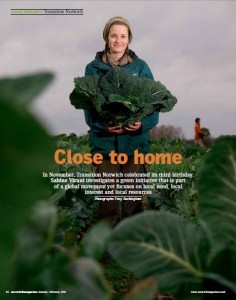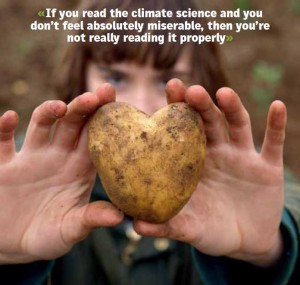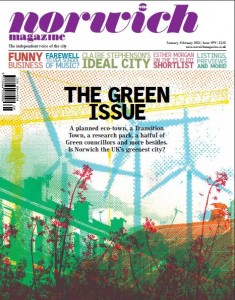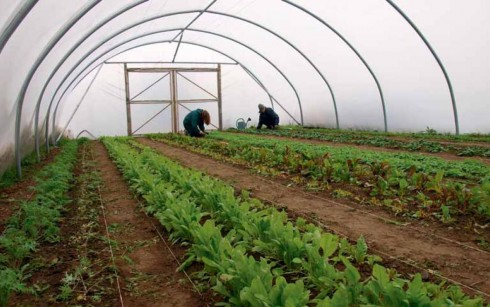9 Jan 2012
From Norwich magazine: Transition Norwich, three years on…
Here’s a great article from the latest edition (‘The Green Issue’) of Norwich magazine, to whom I am very grateful for permission to republish in full. You can also download the pdf of the article here with more of Tony Buckingham’s excellent photos here.
Close to home
In November, Transition Norwich celebrated its third birthday. Sabine Virani investigates a green initiative that is part of a global movement yet focuses on local need, local interest and local resources.
 It was all going so well until the tractor died. Thirty members and friends of Norwich FarmShare had turned up at the five-acre farm next to the Postwick Park & Ride to bag the last of the year’s potato harvest. It was an urban-dweller’s day out and a nice way to spend a warm Saturday in October. All they had to do was walk behind the potato harvester, pick up the freshly lifted spuds and pop them in a bag. But half-way down the second row, the tractor gave up the struggle.
It was all going so well until the tractor died. Thirty members and friends of Norwich FarmShare had turned up at the five-acre farm next to the Postwick Park & Ride to bag the last of the year’s potato harvest. It was an urban-dweller’s day out and a nice way to spend a warm Saturday in October. All they had to do was walk behind the potato harvester, pick up the freshly lifted spuds and pop them in a bag. But half-way down the second row, the tractor gave up the struggle.
Fortunately for the farm, these were committed volunteers. The farm is a cooperative, and though the land is rented, the business is owned by its members, who give about nine hours a year of their time and pay a monthly subscription in return for a weekly share of the harvest throughout the year. Faced with a dead tractor, they simply grabbed the garden forks and started digging. In all, they hauled some two tonnes of spuds that day.
Leading a tour of the farm in late November, head grower Tierney Woods apologises that it is so bare. Yet the fields still seem generously full of chemical-free vegetables for cropping through the winter and into the spring: leeks, onions, spring cabbages, broad beans and garlic. There are a few carrots left, too – although the rabbits are showing an interest and might finish them off – and rows of purple and green ‘January King’ cabbages that look
fit for an artisan grocer’s in Primrose Hill. And then there’s the asparagus bed and the polytunnels.
In its first 12 months Norwich FarmShare recruited 70 members. By taking on two more acres, building soil fertility and cropping more closely, the cooperative hopes to increase membership to 200 in 2012. Norwich FarmShare is seen by many as the flagship project of Transition Norwich, an initiative that was launched in St Andrew’s Hall in October 2008. Some 400 people attended the launch, drawn by shared concerns about global dependence on a finite resource: oil.
For many at the launch, climate change was the overwhelming concern. But others were just as concerned about warnings from some petroleum geologists that global oil production has already peaked (a phenomenon known as ‘peak oil’), and that what is left will be harder and more expensive to access. Almost every aspect of modern life depends on oil, and some believe that the galloping rate and scale of oil-hungry development in China and India will have a sharp impact on the price and availability of oil in the near future, leading to rapid and unprecedented challenges.
A different form of action
Many people still can’t really get their heads around climate change, much less peak oil. These are global issues, wrapped up in complex science and economics, accompanied by nightmare scenarios and outright (if diminishing) denial. It’s easier to ignore the lot and carry on as normal.
 Yet while many of us continue to live as if we’ve never heard of these things – do you cycle rather than drive, or measure the tea water before boiling? – others are taking action. Not the save-the-rain-forests sort of campaigning action that’s now widespread, but something closer to home. In a wide field of environmental and progressive organisations, with countless opportunities to protest against government and big business, the Transition movement is creating a stir with a different approach.
Yet while many of us continue to live as if we’ve never heard of these things – do you cycle rather than drive, or measure the tea water before boiling? – others are taking action. Not the save-the-rain-forests sort of campaigning action that’s now widespread, but something closer to home. In a wide field of environmental and progressive organisations, with countless opportunities to protest against government and big business, the Transition movement is creating a stir with a different approach.
Now a global phenomenon, the Transition movement dates back to 2003, when founder Rob Hopkins first learned of peak oil. At the time, he was teaching permaculture (an ecological design system) in Kinsale, Ireland, and was so struck by the concept, he had his students apply permaculture principles to create a local response to the challenge presented by peak oil. Their work was published in 2005 as the Kinsale Energy Decent Plan, which was later adopted as policy by the town council.
Keen to replicate the process elsewhere, Hopkins returned to Devon, where he launched Transition Town Totnes in 2006. A number of rural and urban Transition initiatives quickly followed across the UK, before the ideas caught on Australia and New Zealand. When Norwich resident Christine Way learned about the movement, she began to recruit the team who helped Norwich became 50th initiative to register with the Transition Network. There are now over 900 registered initiatives globally – with many more unregistered – spread over 35 countries.
Transition initiatives share a grassroots, community-based model, using the framework laid out in Hopkins’s The Transition Handbook (2008) and The Transition Companion (2011). In the handbook, Hopkins spells out a number of differences between Transition and more conventional environmentalism. Transition focuses on resilience and relocalisation, rather than sustainable development. Transition uses hope, optimism and proactivity – rather than fear, guilt and shock – as drivers for action. Its tools are public participation, arts, culture and creative education, as opposed to campaigning and protesting. And it seeks policy change not through lobbying, but by initiating projects that can appeal to voters – and hence politicians – of all persuasions. In the nearby Transition initiative Sustainable Bungay, a life-long Tory voter volunteers comfortably alongside a commited Marxist on a project that promotes local, seasonal food.
While there is a clear set of Transition principles and tools, each initiative is encouraged to develop independently according to local need, interest and resources. In its first three years, Transition Norwich has been exploring what resilience in Norwich might look like. Energy is at the root of the Transition movement, and Norwich developed two approaches to helping individuals reduce their energy usage. Christine Way began to lead Carbon Conversations, a model developed in Cambridge for people to meet in small groups to explore climate change from a personal perspective, and to think creatively about ways to reduce their own carbon footprints. A £20 fee covers the course book and expenses, and more than 100 people in Norwich have completed the six-session course. Way estimates that participants have reduced their CO2 emissions by an average of about one tonne each. Meanwhile, taking a more homespun approach, 15 local Transition members set out, and reportedly managed, to cut their CO2 emissions to four tonnes annually, less than half the UK average.
The Magdalen Street Celebration is another Transition Norwich project, launched in 2010 by Helen Simpson, Karen Steadman and Stefi Barna. “Magdalen Street has the biggest concentration of antique, charity, second-hand and vintage shops in the city, and that fits with the Transition spirit of reuse and recycling. The vast majority of the shops are locally owned, and that is part of the Transition idea of localism. There are also shops that teach craft skills, and it has the largest number of international food shops in the city. So we saw the theme of the street celebration as representing creativity, sustainability and diversity. These are the things that make a neighbourhood vibrant and resilient.”
Transition Norwich has now run two Magdalen Street Celebrations. So far the programme has featured everything from bands under the flyover to medieval musicians in St Saviour’s church, with buskers, stiltwalkers and clowns roaming the street and Anglia Square. There are also creative workshops for families, and dozens of community stalls.
“The celebration seems to work as a way of bringing residents, shoppers and ‘fans’ of the street together, and to promote local businesses and local bands and artists,” says Barna. “It’s also a fantastic opportunity for the community to take charge of how the neighbourhood should develop. What do we want to do with the open space under the flyover? How can we support the businesses better?”
This Low Carbon Life
Transition Norwich currently has no committee, or ‘core group’, to help steer its course. So in its absence, the communications group has taken on a greater significance. As part of this group, Charlotte Du Cann puts out a monthly news bulletin, listing upcoming local events. She also coordinates This Low Carbon Life, Transition Norwich’s daily blog of features. It’s written by a community of between eight and 12 regular bloggers, with a rota to ensure someone posts a blog every day. Often on a Sunday, the blog is open to anyone. Du Cann, once a fashion journalist and now a committed Transition member, doesn’t necessarily agree with everything that’s written, but says: “The blog is about creating an alternative media infrastructure, giving a voice to ideas that wouldn’t necessarily get into mainstream media.” Now going for two years and the model for a national Transition blog, This Low Carbon Life is something Du Cann is particularly proud of.
Another Transition Norwich project is the development of a low carbon cookbook. Transition events generally involve food, with participants each bringing a dish to share. The emphasis is on seasonal, organic, local or fair trade, vegetarian food. A group has been meeting for over a year, writing down recipes, taking photos, making notes and writing blogs. The cookbook will include not only recipes, but a directory of food-related issues, from food sovereignty and raw food to waste and the political, economic and social justice ethics of what we eat. They’ll be looking for a publisher this year.
Three years and counting
In November 2011, Transition Norwich celebrated these and many other projects and events at its third anniversary celebration. Rob Hopkins came to speak and share the work of Transition initiatives around the world. Asked whether he is still able to maintain the optimism for which he has been known since the early days of the Transition Movement, he responded by quoting entrepreneur and environmentalist Paul Hawken: “If you read the climate science and you don’t feel absolutely miserable, then you’re not really reading it properly. But if you tap into the movement of people who are doing something about it and you don’t feel inspired, then you don’t have a heart.”
Like most groups, Transition Norwich is not without its internal struggles. Several former members acknowledge that, while it has acted as a catalyst for FarmShare, Norwich Community Bees and various other things, it could do much more. One concern with Transition initiatives generally is their flat organisational structure: though this has various benefits, it can mean that nobody drives things forward.
One active member also notes, “There’s no mechanism for dealing with personality clashes and power struggles, which inevitably occur, so good will and good people are sometimes lost. Still, there’s room for those who want to solve a problem, who have a vision. We can get caught up in the people politics, but we have bigger battles to fight.” That sounds like an invitation to get involved.
www.transitionnorwich.org
www.transitionnorwich.blogspot.com
www.norwichfarmshare.co.uk
www.transitionnetwork.org


josiah Meldrum
13 Jan 10:59am
Hi Rob,
Many thanks for posting this – Sabine wrote a great article and Tony’s photos are very special. We’re planning for the 2012/13 growing season now, better establishing the farm infrastructure and working on a range of outreach projects as well as expanding our membership.
If any transition initiatives want to come and see us and find out how and what we’ve done they’d be more than welcome – we’ll be hosting a series of farm open days through the year.
I and my colleague Nick have just finished writing a report about CSA in England for the Soil Association – this too might be useful for transition initiatives looking at community supported agriculture: http://www.soilassociation.org/LinkClick.aspx?fileticket=DnZ0pAZbjzM%3d&tabid=204 and there is tonnes of information on the Soil Association’s website: http://www.soilassociation.org/communitysupportedagriculture
It’s worth pointing out that support for CSA development funded by Making Local Food Work ends this spring, so if a group is thinking about this it would be well worth taking advantage of the expertise on offer sooner rather than later.
Thanks again for being so enthusiastic about our farm!
Best wishes,
Josiah